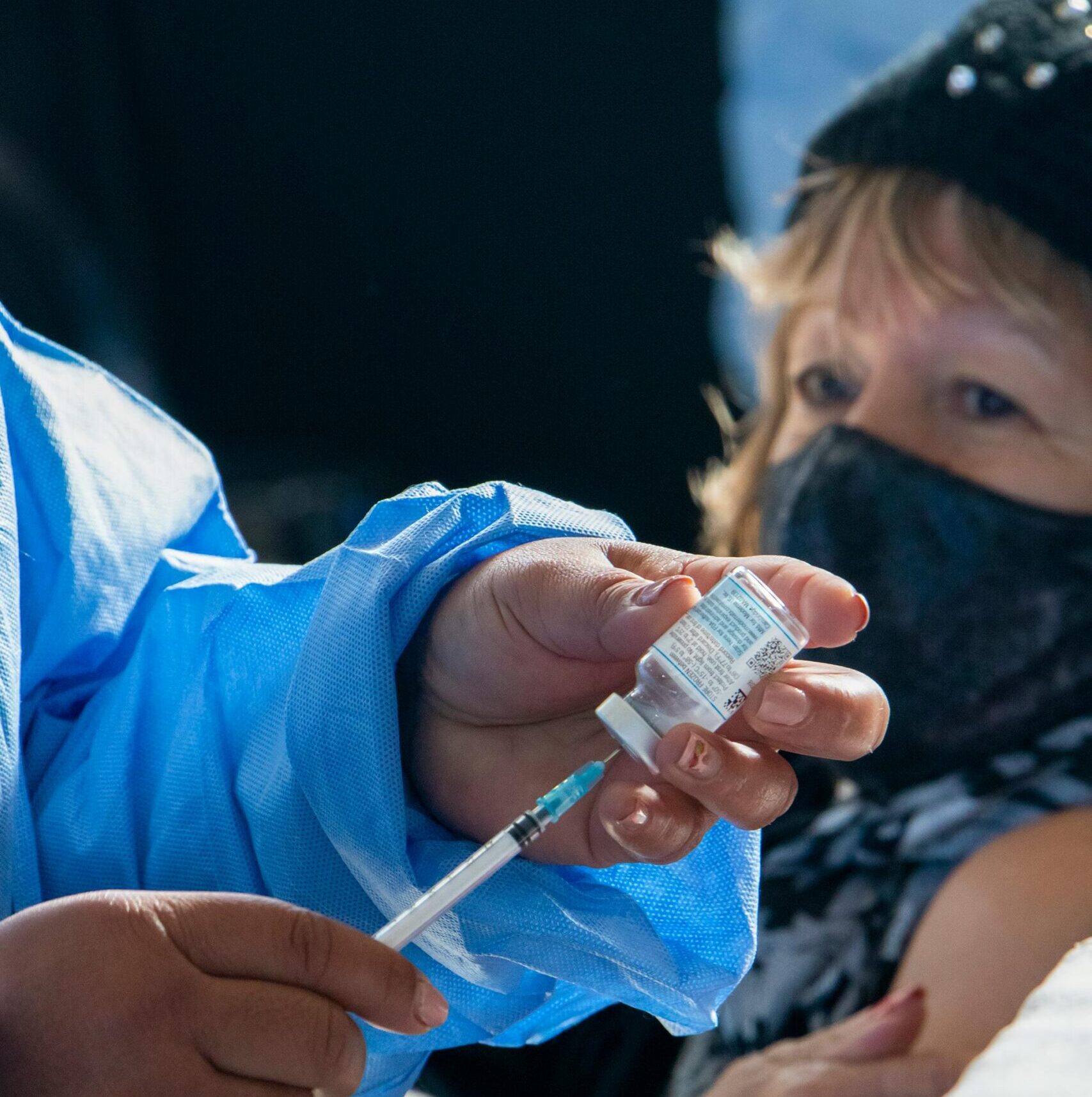PhotoCredit: Vico Mendoza.
What has lately been the biggest threat to global health and prosperity? You might think it is the all-consuming, extremely destructive pandemic that is currently wreaking havoc across the globe. Yet, I want to argue that the pandemic is only part of the problem. The biggest threat to global health right now is, as always, rich, greedy bastards.
To be more precise, the greedy bastards I want to zoom in on are the big pharmaceutical companies currently producing and patenting the much-needed Covid-19 vaccine. With reference, in particular, to their continued placing of intellectual property (IP) rights on the vaccine.
There are surprisingly sound reasons for allowing producers of new technologies and products valuable for public health to protect their innovations with IP restrictions. For one, vaccines are expensive and risky to produce. Therefore, it can be extremely difficult to find investors if the earnings on the vaccine are not protected. Further, if the production of the vaccine is not protected by any form of IP rights the distribution, brand, quality and copying of the vaccine cannot be controlled by the company whose name will be associated with the vaccine. Especially in the production of a high-stake vaccine, such as the one the globe is currently in desperate need of, the manufacturing companies should be allowed some measure of control over the distribution. It is simply good business to keep a tight grip around the distribution of the innovation your
company is bringing into the market.
Even more importantly, the discovery of a new vaccine takes time and poorer nations need large supplies but cannot afford to pay high prices, and what company would want to invest in a product trial that is long, risky, and most likely unprofitable? Hence a vast number of IP rights followed by steep prices often surround the invention of vaccines in
order to secure a profit for the corporation.
To sum up, pharmaceutical corporations like to place IP rights on their products because it allows them to protect their invention and create monopoly-like scenarios for distributing this often vital product – which means that they can put the price on their vaccines as high as their conscience will allow. To make matters worse, the governments of the high-income countries where the vaccines are being produced initially chose the selfish route of ensuring the vaccine (in quantities a lot higher than needed) for their populations, instead of committing to fair global distribution.
Alongside corporate investments, a lot of our nations’ governments have invested massively in Covid vaccines. Of course, most of our governments have incentives that go beyond creating a profit. Unfortunately, they have been incredibly ineffective at
addressing the more humanitarian aspects when investing in the Covid vaccine. Such as securing equal distribution, transparency, or charges only at cost price (https://msfaccess.org/covid-19-vaccines-recommendations-equitable-access). It seems that government funding has sped up the process of developing the vaccine and removed a lot of the risks often involved in developing vaccines for the pharmaceutical corporations, amongst others by signing procurement contracts for a large number of doses (in the U.S. and globally)
(US example: https://www.healthaffairs.org/do/10.1377/hblog20210512.191448/full/ , global investments: https://www.devex.com/news/interactive-who-s-funding-the-covid-19-response-and-what-are-the-priorities-96833 ). However, governments have not supported the global need for the vaccine through the negotiation of specific terms
for their investments in them.
There are of course rules and institutions in place with the purpose of limiting IP rights on vital healthcare innovations such as vaccines. The TRIPS Council (Trade-related Aspects of Intellectual Property Rights Agreement) of the WTO works towards making agreements on limiting patent rights on products that provide global health benefits.
(https://www.wto.org/english/tratop_e/trips_e/trips_e.htm)
Therefore, on the 2 nd of October 2020 India and South Africa asked the WTO to allow all countries to choose to not enforce IP rights related to Covid-19 drugs, vaccines, diagnostics etc. until global herd immunity has been reached
(https://msfaccess.org/landmark-move-india-and-south-africa-propose-no-patents-covid-19-medicines-tools-during-pandemic). A very commendable proposition, some might argue, during a global pandemic, from some of the lowest-income countries in the world who wish to preempt future lawsuits and barriers to essential products from
international pharmaceuticals.
However, almost a year later, 100 of the lowest income countries in the world are supporting the temporary waiver of IP rights, while the European Union, the UK, Brazil, Japan, Australia and the U.S. have until very recently been opposing the waiver
(https://www.msf.org/countries-obstructing-covid-19-patent-waiver-must-allow-negotiations, https://msfaccess.org/nocovidmonopolies-timeline ). What an extraordinarily unsurprising turn of events…
The U.S. and Brazil have announced that they will support the waiver. The Biden administration will however only support a waiver of patents on vaccines – which is insufficient if the world’s population is to receive the medical treatment, medicine,
ventilators and so on, that they need in the fight against Covid (https://theconversation.com/trips-waiver-us-support-is-a-major-step-but-no-guarantee-of-covid-19-vaccine-equity-160638) . At the same time, the U.S. has continued to buy extremely large quantities of the Pfizer/BioNTech vaccine for themselves instead of making doses available for poorer countries.
The European Commission and others have stated that waiving patent rights could remove the incentive to innovate (https://www.cnbc.com/2021/04/22/covid-rich-countries-are-refusing-to-waive-ip-rights-on-vaccines.html). While American pharmaceutical companies are advocating a dismissal of the waiver because it may lead
to the loss of competitive advantage against China and Russia (https://www.ft.com/content/fa1e0d22-71f2-401f-9971-fa27313570ab). Once again, an international health crisis has come in second place behind the wants of international
money-making machines and their wish to ensure a competitive edge. And that is why the biggest problem of this world is, as always, greedy bastards who only care about the bottom line of their current investment adventure. And the next-
biggest problem is the governments supporting these adventures.
Or at least so it seems. I would like the conclusion of this article to be this head-on and straightforward. However, the thoughts and ideas of this piece are of course not objective. It may be that my oh-so rich, oh-so benevolent, oh-so socialistic government
might want to complain, or perhaps in some fractions, already have complained to the EU. But for some parliamentary, bureaucratic, lobby-infested reason the complaints are not voiced loudly enough. I am most likely only conveying less than half the picture. I am most likely giving a very crude description of what governments are capable of accomplishing. I am most likely completely neglecting the fact that the only reason why we have several functioning vaccines in the market less than two years after the beginning of the pandemic is because of the hard work of governments smoothing the complicated processes of pharmaceutical inventions and their road to market. And I am most likely completely overstating the devilish and thoughtless work of pharmaceutical companies. Anyway, it would still be nice if such a crude exaggeration did not feel so accurate.

